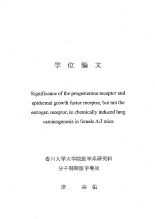Significance of the progesterone receptor and epidermal growth factor receptor, but not the estrogen receptor, in chemically induced lung carcinogenesis in female A/J mice
この論文にアクセスする
著者
書誌事項
- タイトル
-
Significance of the progesterone receptor and epidermal growth factor receptor, but not the estrogen receptor, in chemically induced lung carcinogenesis in female A/J mice
- 著者名
-
岸, 宗佑
- 学位授与大学
-
香川大学
- 取得学位
-
博士(医学)
- 学位授与番号
-
甲第604号
- 学位授与年月日
-
2015-03-24
注記・抄録
AbstractIn the present study, the expression levels of female hormone receptors, estrogen receptor (ER) and progesterone receptor (PR) and the epidermal growth factor receptor, (EGFR), as well as proliferating cell nuclear antigen (PCNA) were examined in lung tumors that were induced by 4‑(methylnitrosamino)‑1‑(3‑pyridyl)‑1‑butanone (NNK) in female A/J mice. Each seven‑week‑old mouse was administered with 2 mg NNK via intraperitoneal injection and the mice were subsequently euthanized at week 52. Lung tumors, including adenomas, carcinomas in adenomas and adenocarcinomas, were obtained and analyzed by immunohistochemistry for the expression levels of the receptors, ER, PR and EGFR, and PCNA. The results were as follows: i) In mouse lung adenomas, a significant correlation was identified between the size of the tumor and PCNA expression, although not with the expression of the receptors (ER, PR and EGFR); ii) in the carcinoma components of the carcinomas in adenomas, the size of the tumor and PCNA expression were correlated, while EGFR expression demonstrated a significant correlation with PR expression; iii) in adenocarcinomas, the tumor size significantly correlated with PCNA, EGFR and PR expression; and iv) EGFR and PR expression was identified to be significantly correlated in adenocarcinomas, and to a certain extent in the carcinoma components of the carcinomas in adenomas, although not in the adenomas. Notably, ER expression was not associated with tumor growth or the other factors, particularly EGFR expression, and no significant differences were identified between the three types of lesion. These results indicate that PR, like EGFR, may be significant in lung carcinogenesis.
Abstract In the present study, the expression levels of female hormone receptors, estrogen receptor (ER) and progesterone receptor (PR) and the epidermal growth factor receptor, (EGFR), as well as proliferating cell nuclear antigen (PCNA) were examined in lung tumors that were induced by 4‑(methylnitrosamino)‑1‑(3‑pyridyl)‑1‑butanone (NNK) in female A/J mice. Each seven‑week‑old mouse was administered with 2 mg NNK via intraperitoneal injection and the mice were subsequently euthanized at week 52. Lung tumors, including adenomas, carcinomas in adenomas and adenocarcinomas, were obtained and analyzed by immunohistochemistry for the expression levels of the receptors, ER, PR and EGFR, and PCNA. The results were as follows: i) In mouse lung adenomas, a significant correlation was identified between the size of the tumor and PCNA expression, although not with the expression of the receptors (ER, PR and EGFR); ii) in the carcinoma components of the carcinomas in adenomas, the size of the tumor and PCNA expression were correlated, while EGFR expression demonstrated a significant correlation with PR expression; iii) in adenocarcinomas, the tumor size significantly correlated with PCNA, EGFR and PR expression; and iv) EGFR and PR expression was identified to be significantly correlated in adenocarcinomas, and to a certain extent in the carcinoma components of the carcinomas in adenomas, although not in the adenomas. Notably, ER expression was not associated with tumor growth or the other factors, particularly EGFR expression, and no significant differences were identified between the three types of lesion. These results indicate that PR, like EGFR, may be significant in lung carcinogenesis.
